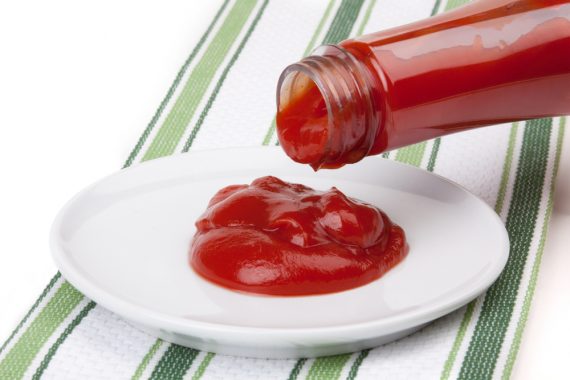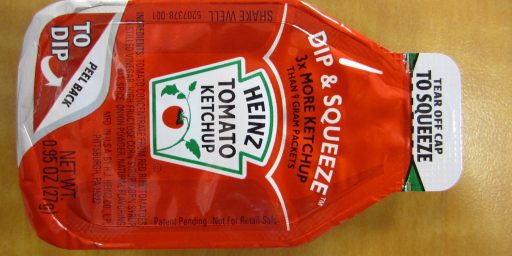MIT, Harvard Battle To Make It Easier To Pour Ketchup
Is there any problem an engineer won’t try to solve? Based on this story, it would appear the answer is no:
It’s the world’s biggest non-problemic problem: getting the last bit of ketchup out of the jar. Ketchup is so viscous, and it seems so eager to stick to glass and plastic. But leave it to students at the Massachusetts Institute of Technology to solve the greatest non-issues of our generation: A team of engineers have designed the perfect condiment bottle — one that ketchup simply cannot stick to
The secret is in a futuristic substance known as “LiquiGlide,” a non-toxic, FDA-approved coating that can be applied to the interior of bottles. According to MIT PhD candidate Dave Smith, it’s “kind of a structured liquid — it’s rigid like a solid, but it’s lubricated like a liquid.” Regardless of what the bottle is constructed of, liquid or plastic, ketchup will flow out of it nearly effortlessly.
It seems like ketchup sticking to the inside of bottles is a more compelling problem than many realize — a rival team at nearby Harvard University have been working on similar, plant-derived, ketchup bottle technology. And the idea of a friction-less ketchup bottle caught enough people’s imaginations to win the audience choice award at the MIT $100K Entrepreneurship Competition.
Ending bottle friction is a noble goal. Any technology to get ketchup out of bottles easier could make a serious dent in helping reduce food waste in a $33 billion condiment industry. Smith explains that the new bottles “could save one million tons of food from being thrown out every year.”
Here’s video of the MIT project in action:
Guys, there’s a simpler solution, it’s called gravity.
Ketchup Being Poured image via Shutterstock







And the lawyer is going to poke fun at engineers for wasting their lives on pointless problems?
Reducing food waste by a million tons a year will for more for humanity than an entire army of lawyers.
I hope they can come up with a version for application to car exteriors! It’d let those damned ‘lovebugs’ slip off the car before their body acids start etching the paint.
I’m pretty sure someone wrote up a joke grant application for “lubricated condiments”, and was surprised that they got the grant. And once you have the grant, you’ve got to work on it…
Well, condiments weren’t the original goal of the research. But even if it were, I’m sure that there’s money in it. There are lots of seemingly small things that have significant market impact. For example, twist-off bottle caps, self-stick stamps, etc. If you can make a billion people have even a slight preference for your product at the right cost, you can make a lot of money.
Actually, this can be applied to a large number of slurries in food and material production plants as well. Very useful!
The idea was probably not just for ketchup, but for any thixotropic liquid, of which ketchup is about the most common example that we regularly come in contact with. (It’s also much easier to get your hands on test samples.) Also see non-Newtonian liquids.